Childhood Hunger: Increasing Potential by Feeding Kids Nutritious Foods
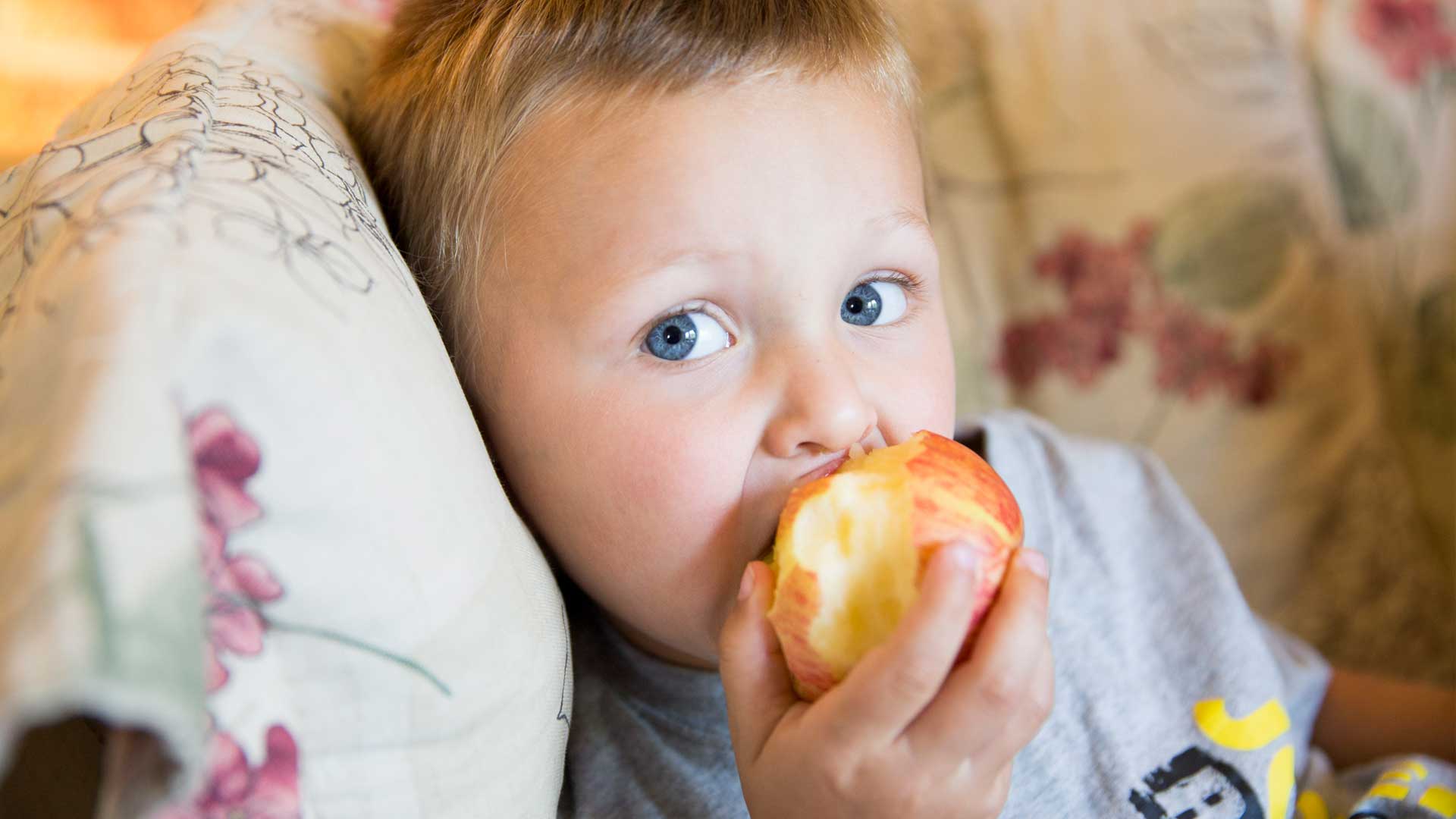
At the Maryland Food Bank, we know hunger is a cycle that plagues generation after generations of families across the state of Maryland. We also know that interrupting this cycle of instability requires addressing the root of the problem: food-insecure children who are too often robbed of the opportunity to thrive.
Statewide, 1 in 7, or nearly 205,000 Maryland children don’t always know where their next meal will come from. While the ratios vary from in 1 in 4 kids in Somerset County to 1 in 8 children in Frederick County, the insidious effects of child hunger are consistent.
“Hunger is a bad enough problem for adults, but when it comes to kids, it’s so much worse,” said Tim Regan, executive director of MFB’s FoodWorks culinary training program. “We know that a lack of quality, nutritious food impacts kids’ development, their attendance at school, and their overall physical and mental health.”
Consequences of Childhood Hunger
Extensive research on childhood hunger shows that hungry children are more likely to suffer from physical illnesses such as anemia and asthma and have less energy for physical activity and social interactions.
Children without consistent access to food also tend to experience mental health, behavioral, and developmental issues:
- Toddlers have trouble with attachment, and can be more hyperactive
- Young children exhibit impulsivity, aggression, defiance, and poor peer interactions
- Teens experience depression, have poor attention spans, and display non-compliant behaviors
Food insecurity also puts children at a significant disadvantage in terms of academic performance. Food insecure children:
- Are more likely to repeat a grade in elementary school
- Score 17.5 percent less on standardized math tests – the difference between an A and a C+
Through our MFB Kids programs, we invest the time and resources into feeding children so they can achieve their full potential academically, personally, and socially.
“Hunger is a feeling you have when your body needs a certain amount of energy.”
“When I see kids eating, it fills my heart,” said FoodWorks Logistics Supervisor Kelly Salters, about her routine site visits to monitor our feeding programs. “You can tell they really need this food, and I don’t know if they would be getting food if they were home.”
Combating Childhood Hunger
As part of MFB 2.0, a robust strategic plan that will be implemented over the next five years, we are increasing our focus on providing access to nutritious food for food-insecure Marylanders, particularly children. We believe that by helping kids make healthier choices at a young age, they will develop better habits early on for life-long success.
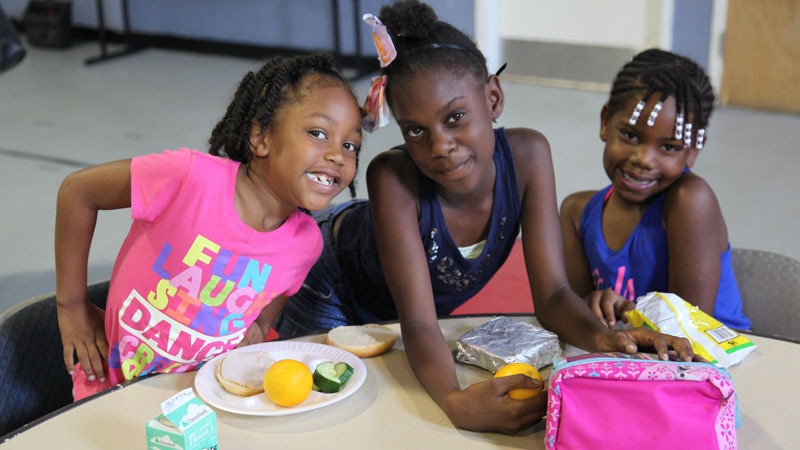
“We know that we’re reaching a lot of kids through our programs, and we know how important these meals are for them. We’ve been growing our programs every year, and yet, the need is still great,” said Regan.
That’s why, in addition to providing a child with a hot meal or a backpack of food to take home, we’re offering more impactful services that address the root causes of hunger in the first place.
The children we serve are part of food-insecure families that struggle to make ends meet, often making tough choices between paying bills or rent and putting dinner on the table. If we can help their parents secure good paying jobs that lead to careers, imagine the impact stability and food security that comes with it will have on their children’s lives. If we can help families break the cycle of food insecurity, imagine the ripple effect it can have on generations to come.
This dedication to serving not only children, but the entire family, requires a staff and network of supporters that are wholeheartedly dedicated to our mission.
“My job is not a 9 to 5 job, but I’m okay with that. I’m dedicated to this mission, to helping these kids, because they are our tomorrow,” Salters said. “If we don’t help them now, then what happens? They need to know that somebody is there for them.”
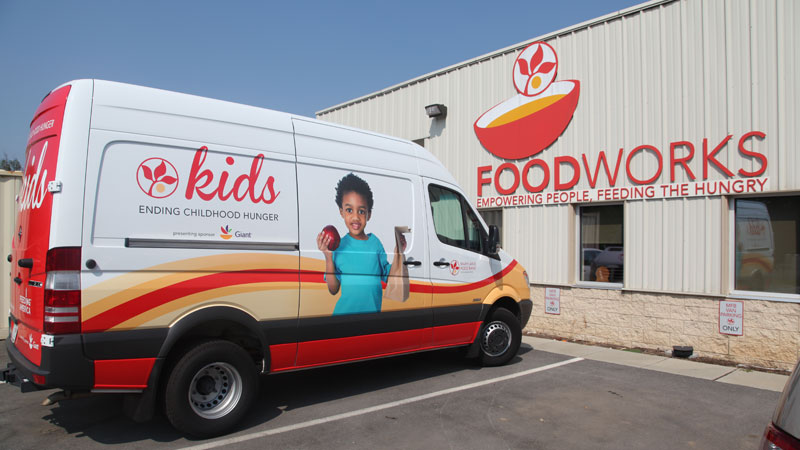
MFB Kids Programs Target Childhood Hunger
We take a year-round approach to fighting childhood hunger because kids need food 365 days a year. Here’s a look at the MFB Kids programs that are dedicated to feeding food-insecure children:
School Pantry: MFB works with hundreds of schools statewide to set up food pantries that provide a reliable source of healthy foods to families throughout the school year.
“Our school pantries run a lot like a typical food pantry at a church or any other organization, but because they’re in a familiar setting that is already part of their lives, parents are more comfortable accepting food for their families,” said Regan.
Social worker Chezonne Johnson works at Gardenville Elementary School in northeast Baltimore, home to one of MFB’s school pantries, and knows how important the school pantry is in her community.
“Many times, families buy food from corner stores — usually with high sugar and salt content — not a lot of healthy options, and the pantry allows families to have access to more fresh fruits and vegetables,” said Chezonne.
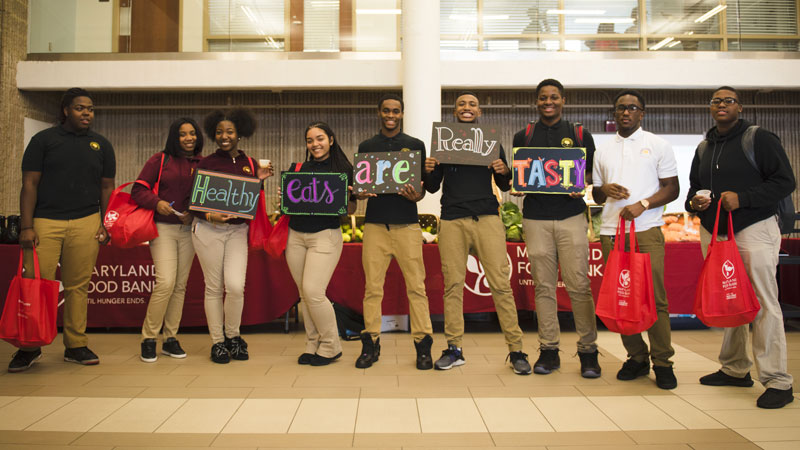
HEART Markets: HEART Markets stand for Healthy Eats Are Really Tasty. As our focus on nutrition has ramped up with the implementation of our strategic plan, the HEART Market model has allowed us to deliver food during school events to ensure greater reach to local families.
HEART Markets combine the distribution of fresh produce (60 percent) and staple groceries (40 percent) with music, nutrition education, and food demonstrations to inspire healthy choices.
“Kids are always on guard, so HEART Markets are a great way to break down stigmas and barriers that come with being hungry” said Deonta Sweet, HEART Market coordinator. “They like the music and wellness activities but being able to take home a bag full of groceries instills a sense of pride.”
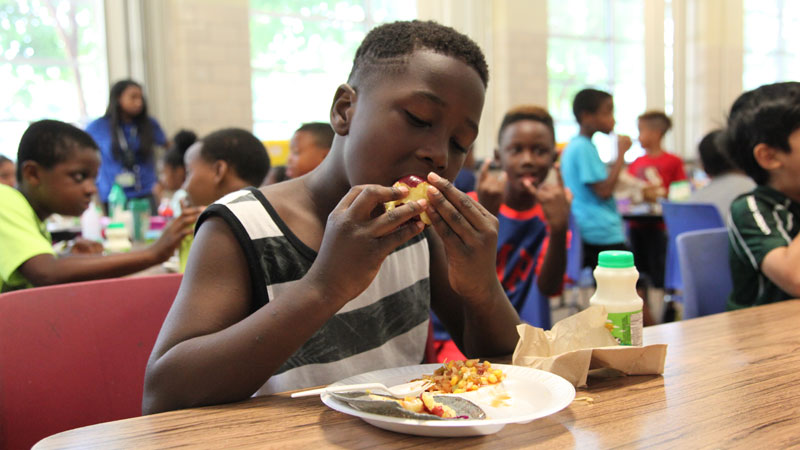
Summer Clubs and Supper Clubs: When school is out of session, during the evenings and over the summer months, kids are still hungry and need nutritious foods to stay active. That’s where we come in. We provide nutritious meals to students in after-school and summer programs that are held at established community organizations, like Boys & Girls Clubs and recreation centers.
“Our feeding programs help us address the need that’s core to our mission at the food bank: serving kids who are hungry,” said Regan. “It’s a different twist from how the food bank typically distributes food; We’re actually serving prepared meals to kids in need, introducing nutritious and quality food in new ways.”
Both programs are federally reimbursed through the United States Department of Agriculture (USDA) and managed by the Maryland State Department of Education (MSDE), which requires adherence to strict nutritional guidelines.
Preparing for Picky Eaters
What makes MFB’s feeding programs unique? It’s the food! We prepare fresh meals daily in our Charles T. Bauer Community Kitchen with the support of professional chefs and chefs in training from our FoodWorks program. These, FoodWorks students who are ServSafe certified and are actively involved in the food preparation for our meal programs, while also learning about the realities of food insecurity for children.
FoodWorks chefs embrace the challenge of preparing meals that kids will actually eat, while adhering to the USDA guidelines for child feeding programs.
“We make sure the kitchen is preparing things that kids want to eat,” said Chef Joanna, FoodWorks chef trainer. “I don’t want to say we just give them a meal; I want to make sure it’s something they want to eat so that they will continue to come back to the site day after day.”
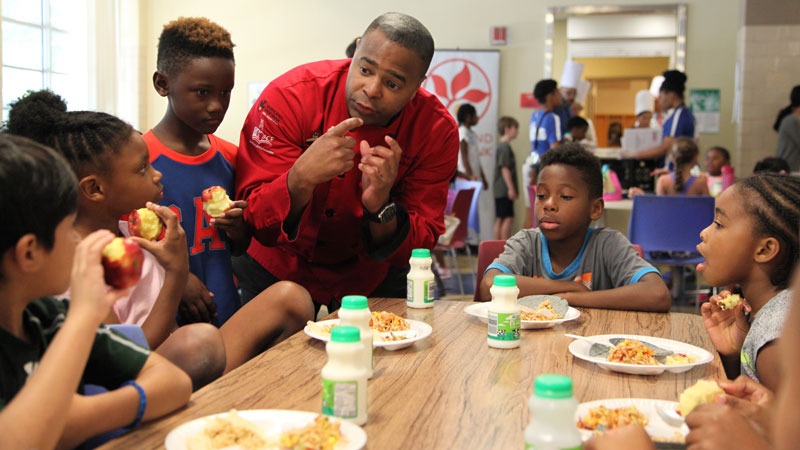
Our goal is to produce nutritious, innovative meals that kids desire, which requires collecting ongoing feedback from them about what they like and don’t like.
Once the meals are prepared, our logistics team loads them into MFB Kids vans for delivery during specified windows of time, paying careful attention to the temperature of the food and how the meals are served. MFB staff regularly visit our community partner sites to ensure we’re maintaining the highest level of quality service.
If you see an MFB Kids van on the road, be sure to wave hello!
Join Us in the Fight Against Childhood Hunger
We believe that how we address child hunger today will determine the health of our communities decades from now.
But we can’t do this work alone.
Organizations like Giant Food have shared our vision for Maryland’s children and have generously supported MFB Kids programs since 2010.
We have built—and continue to build—robust programs to feed hungry kids, thanks to those who are eager to invest in our future generations. It all starts with children, the future leaders of our state.
Hunger is complex, and ever-changing – but since we have you by our side, we’ll be able to continue to develop innovative solutions to do more for Maryland’s hungry children.
We Need Your Help
Programs, campaigns, and educational outreach at the Maryland Food Bank has always relied on the philanthropic support of charitable individuals like you.
Much like our food distribution efforts, outreach activities at the Maryland Food Bank rely on generous donations of money and time.
We hope you’ll consider a contribution.







